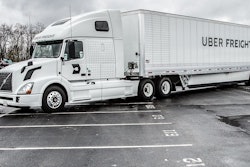
Uber Freight has been the talk of the town ever since the company launched a website late last year and began testing its new system in Texas. Then in May, Uber's latest brainchild launched its service to cover the whole country and offer truckers the opportunity to be their own freight brokers, instead of using traditional methods.
While there have been a variety of services for a while that have attempted to automate one or more of the aspects of freight brokering, none of them are quite on par with Uber's technical capabilities. Yet, given how robust an industry freight brokering is, will Uber Freight really be able to, in the lingo of Silicon Valley, disrupt it?
Read on for an overview of what Uber Freight promises, and what its impact on the freight industry may be!
What Uber Freight is About
Uber Freight claims that its mission is to improve truckers' lives by offering them a service that will eliminate the waiting and guesswork that is often associated with getting a load. The company plans on doing this by putting truckers directly in touch with shippers. All of this will be achieved through the help of the Uber Freight app which makes accepting a job a matter of tapping one's smartphone screen several times.
The company claims the desire to significantly improve truckers' lives, and grant them an 'instant experience' is what sets them apart. And, indeed, so far, no other freight management app out there has been able to do that.
The other promise that Uber Freight makes is that it will guarantee prompt payment to truckers, within a week of completing a job, which flies in the face of standard payment times in the industry which typically take a month or more. Moreover, Uber also promises to pay drivers for any delays or unexpected and additional services they provide. They will provide $300 for layover per day, $200 for orders that were not used, $75 for driver assists and $75 for detention after two hours.
By putting themselves and their more robust technology between the trucker and the shipper, Uber hopes to tap into the $700 billion trucking industry. Given how successful Uber has been in etching out a place for itself in the taxi industry, should freight brokers be concerned that Uber will soon claim a considerable piece of the market for itself?
Will Uber Freight Change the Freight Industry Landscape?
It is too early to say whether Uber freight will have any significant effect on the freight industry. Its technological capabilities and the manpower behind will probably allow it to go after some low-hanging fruit by simply reducing the time that truckers spend on planning their trips. This in itself is already a serious challenge for brokers.
Furthermore, Uber Freight claims that they will challenge the practices that have given "brokers" a bad name--gouging rates, employing bait-and-switch tactics, juggling with loads to find the lowest bidder or being notoriously slow with making payments. While all that criticism may have some merit, Uber is not necessarily the one to shake its finger at brokers. Its own track record is by far not the best when it comes to its treatment of employees or drivers.
Moreover, since Uber Freight is itself now a brokerage, though a high-tech one, it is not entirely clear whether individual states won't attack the company with legislative measures in this area as well. This could mean increases in amounts for freight broker surety bonds or stricter operational requirements. While nothing is on the horizon just yet, if Uber Freight really does pick up, some sort of legislative response would probably not be too far down the line.
Finally, automating the job of freight brokers to such an extent that it should run seamlessly, and with a high degree of satisfaction for both drivers and shippers, is itself a challenge that Uber still has to master. The difference in complexity between freight brokerage and ride-hailing is one of several orders of magnitude, and should not be too easy to crack even for Uber.
With that said, whether or not Uber disrupts the freight broker industry remains to be seen. But its entrance into the market could still urge everyone in the freight industry to offer better quality services. At the end of the day, this is what truly matters.
















